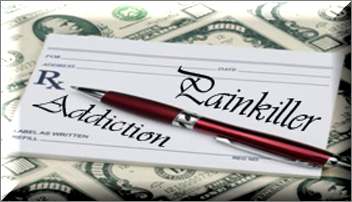The process of eliminating and reducing pain and discomfort without creating an addiction to and dependence on painkillers and drugs.
The number of men and women who find themselves addicted and dependent on painkillers is actually reaching epidemic proportions and really dangerous levels in North America and even greater numbers around the world. The painkiller addiction problem and dilemma is not completely new, and is also growing and developing which is a concern amongst healthcare professionals and specialists and their patients who suffer from this addiction. Many individuals know someone who is addicted to or dependent on painkillers or perhaps are hooked on painkillers themselves.

Interestingly, painkiller addiction and dependence is not just a problem or an issue amongst a particular or specific age group or demographic. Addiction to Painkillers is an issue, problem and concern that affects and impacts men and women from all walks and areas of life. Adolescents, adults and also seniors or elderly people are susceptible to developing an addiction and dependency to painkiller drugs.
The majority of painkiller addiction problems originate from treating arthritis, rheumatoid arthritis or joint disease, back pain and discomfort or other common ailments and conditions. Having already been legally prescribed and recommended and also approved medications through their healthcare provider or medical doctor, many individuals find themselves developing and acquiring a dependency on the drugs, as well as experiencing painful and agonizing withdrawal signs and symptoms in their absence.
Needless to say no one takes drugs or medications with the particular intention or motive to become addicted; nevertheless, some medications and drugs have a higher likelihood or probability to be habit-forming. More often than not men and women who end up addicted to painkiller drugs basically wanted to help relieve the suffering linked to injuries, diseases, illnesses or surgery.

Despite the fact that there are many painkiller drugs with addictive qualities and characteristics, some of the most frequently prescribed drugs are Codeine, Darvon, Demerol, Dilaudid, Oxycodone (OxyContin) and Vicodin.
Probably the most highly addicting and habit forming prescription painkillers or pain relievers consist of chemicals called opioids. Opioids affix to the human brain’s receptors as well as stimulate the actual pleasure center in the brain while at the same time relieving pain and discomfort. With prescription drugs and prescription medications, addiction could be both a psychological along with a biological condition and problem.
As time passes, the body becomes dependent and reliant on these painkillers or pain relievers and cannot function properly without these drugs. Despite the fact that over-the-counter drugs such as ibuprofen usually are not as addictive or habit forming as stronger prescription pills, they could become a problem or issue if over used.
It is not necessarily chronic health issues or medical problems that result in the abuse of painkillers. Numerous painkillers are so powerful and potent that many people become addicted to and dependent on these drugs and medications after simply using them for a short-term. Furthermore, many teenagers are engaging in the recreational abuse of these painkillers – an especially dangerous and risky kind of substance abuse that continues to be on the increase in recent years.
Every year, millions of men and women use doctor prescribed painkillers or pain relievers for non-medical or health-related reasons. Health and Human Service agencies have reported that twice as many men and women are addicted to prescription painkillers than to cocaine. Five million youngsters between the years of twelve and nineteen have supposedly abused doctor prescribed painkillers to get high.
Fortunately, there are healthy choices to coping with chronic pain and discomfort and overcoming addictions to doctor prescribed painkillers and pain relievers.
For instance many individuals who take part in massage therapy or treatments claim that the therapy is an effective and successful technique to lessen pain. In the event the chronic pain is due to inflammation, using heat or cold therapy treatments are a natural approach to deal with the pain without doctor prescribed drugs. A number of natural supplements can also be taken in place of prescription medications and drugs to control pain effectively and successfully.
For individuals with serious and extreme chronic pain, a residential treatment center that focuses primarily on pain might be necessary to assist them to learn to live with this problem and also to manage their chronic pain. However, before taking any prescription painkillers, they need to speak with their doctor concerning issues such as natural remedies and treatments, lifestyle adjustments and the potential risk of addiction.
